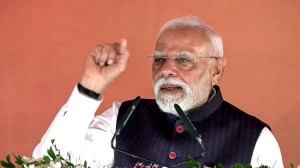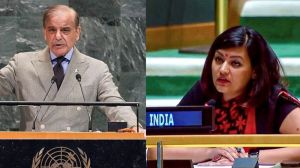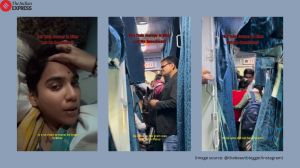As varied renditions of Vande Mataram hit the market, the trivialisation of the original is complete
August 14: You have heard the rousing cry in patriotic films, shouted it out at school functions and crooned it with A R Rahman in Maa Tuj...

August 14: You have heard the rousing cry in patriotic films, shouted it out at school functions and crooned it with A R Rahman in Maa Tujhe Salaam. But you may soon lose track of the lyrical cadences of Bankimchandra Chatterjee’s Vande Mataram, given the speed and success with which varied renditions of the song have been flooding the market and striking the tympanums.
As one more `Vande Mataram album’ gets into competitive crooning today — the first video after the film Anandmath to have all six stanzas of the national song — complaints are being voiced about the constant tampering with the song, its commercialisation and consequent trivialisation. If early renditions of the song underlined its essence and reflected its real spirit, the new variations have sacrified spirit for saleability, the compaint goes.
Among the earliest renditions was the one by Rabindranath Tagore. He put Bankimchandra’s poem to music and sang it at the Indian National Congress’ session in Calcutta. Later, Ravi Shankar created the compact one-stanza version for All India Radio, and Lata Mangeshkar gave it voice in the film Anandmath.
While various renditions followed — Usha Uthup in Making of the Mahatma and M S Subbalakshmi’s Tamil version — it was Rahman’s Maa Tujhe… that next made an impact. After that there has been a flow of new albums like Shubha Mudgal’s Jai Jai Mataram and the latest-in-line six-stanza one by Abhivyakti, which is composed by Hindukush Kadam, a former navyman, and sung by Sadhana Sangam.
Kanika of Bharatbala Productions who created the Maa Tujhe… album claims it “rocked the soul of India and touched the latent patriotism in us all.” The music video has six different versions of the song and 250 clippings on freedom fighters and other national heroes. On Sunday, Bharatbala Productions even brought out a similar album on Jana Gana Mana, with 35 different renditions of the national anthem by artists like Bhimsen Joshi, Kavita Krishnamoorthy and Bhupen Hazarika.
“Bala’s father was a freedom fighter and urged us to do something for our nation while we were still young,” she explains, “so with Rahman’s treatment and our professionalism, we managed to produce a quality album on one the country’s most important songs. The national song has come back to life.”
But while activists of yesteryear took to the streets, patriotism is today conveniently spread — and sold — through television. This Kanika candidly admits, insisting it is not a fad but a serious effort to reach out. Rajiv Sonar of Abhivyakti too hopes he can capitalise on the tube to popularise the new video. “After all it is an effective medium, by which one can rapidly reach a large number of people, especially youngsters,” he says.
Both argue that there are a huge number of listeners who lap up the revised versions and label the complainants revisionist, but voices of protest are making themselves heard. Suresh Chandvankar of the Society of Indian Record Collectors believes such trivalisation will only take youth away from Indian culture. “They won’t really care for the national song but will treat it like any other pop number,” he warns, rubbishing the claims of most producers that their innovative versions are “sincere, researched projects, protecting the sanctity of the song.”
According to him, national integration can’t be given so casual and commercialised a brush-off. “The Rahman video has flags of different sizes, some even lying on the ground,” he protests. “Rock versions or loris, each rendition is more disturbing than the other. It’s just not in good taste.”
Yet, as far as production houses are concerned, this is just the beginning. While Abhivyakti is planning to re-shoot their video in time for the national song’s anniversary in November, Bharatbala Productions have “bigger plans and more dramatic ideas, with the subject always India”. And as the strains of Tagore’s Rabindrasangeet gradually get fainter, does one now await the beat of Vande Mataram in rap?





- 01
- 02
- 03
- 04
- 05


























